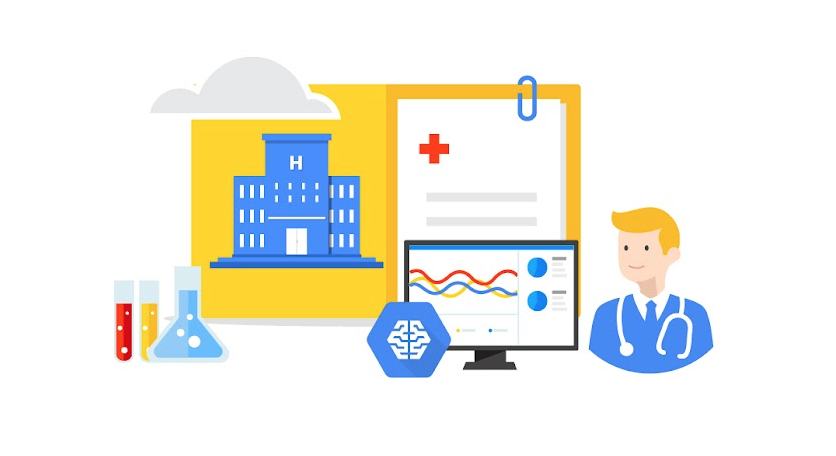
It has been 12-years since Google Health came out of beta mode and introduced itself to the world. Billed as a division within the larger Google company committed to ‘exploring ways to improve patient care, including tools that are already being used by clinicians,’ Google Health has long had a hand in AI. It lists diagnosing cancer, predicting patient outcomes, and preventing blindness as areas of interest on its website, and states that ‘emerging technologies present opportunities to elevate healthcare for everyone.’
Yet it was not Google Health that made an announcement this month about new AI tools that it is making available to improve health outcomes. It was another division within Google called Google Cloud, that offers a paid suite of computing services designed for businesses. The department within Google Cloud relevant to the healthcare industry is called ‘Healthcare Life Sciences.’ That division says it applies “deep industry knowledge to help you meet your toughest challenges while protecting confidential healthcare data.”
The two new products that Google Cloud rolled out this week are ‘Healthcare Natural Language API,’ and ‘AutoML Entity Extraction for Healthcare.’ Both AI-driven products look to assist healthcare practitioners and staff with the review and analysis of healthcare documents. Specifically, Google notes their solutions are geared around improving accuracy and efficiency. “For healthcare professionals, the process of reviewing and writing medical documents is incredibly labor-intensive,” Google states. “And the lack of intelligent, easy-to-use tools to assist with the unique requirements of medical documentation creates data capturing errors, a diminished patient-doctor experience, and physician burnout.” Below is info on each product, as stated by Google.
Healthcare Natural Language API enables auto summarization of medical insights
With the Healthcare Natural Language API, enterprise customers can now better coordinate valuable medical insights that are captured in unstructured text, such as vaccinations or medications, that may be overlooked as patients move through their healthcare journeys. This solution can drive measurable outcomes by lowering the likelihood of redundant bloodwork or other tests, reducing operational spending, and improving the patient-doctor experience.
How does it work? The Healthcare Natural Language API identifies medical insights in documents, automatically extracting knowledge about medical procedures, medications, body vitals, or medical conditions. By using machine learning, the API identifies clinically relevant attributes based on the surrounding context. For example, it discerns medications prescribed in the past from medications prescribed for the future and it picks up the likelihood of a specific symptom or diagnosis, as captured in language nuances. It can also distinguish medical insights that pertain to the patient from information that pertain to a patient’s relative.
AutoML Entity Extraction for Healthcare facilitates custom information extraction
Healthcare professionals may not have the technical expertise on-hand to build their own tools for extracting information from digital documents. With AutoML Entity Extraction for Healthcare, we’ve made this much easier to do via a low-code interface, letting healthcare professionals build information extraction tools for gene mutations and socioeconomic factors, for example. AutoML Entity Extraction for Healthcare enriches digital health applications such as telemedicine, drug discovery, or clinical trials for rare diseases.
“The richest information about the health of a patient is typically not found within the structured fields of a medical record system. Instead, it is contained within the lengthy free-text notes that a clinician either types or dictates into the medical record in the course of care,” says Michael Ames, the Senior Director of Healthcare and Life Sciences for one of Google’s partners.
Digging through data to find information that may help improve health outcomes is something we appreciate at UCIPT. Our institute is integrated into the Department of Emergency Medicine at UCI research hospital and much of our work is focused around social media interventions that can help change behavior. Our HOPE HIV study is an example of this, whereby Facebook groups are set up to both foster community and to assess potential increases in HIV tests as a consequence of information provided by peer leaders within those Facebook groups.
We are always on the lookout for interesting new applications that are looking to make the lives of patients better. Utilizing advanced technology to streamline mundane, time-consuming parts of healthcare workers’ jobs and increase knowledge management within their organizations is important, particularly in this pandemic that we have all found ourselves thrown into this year. These new products do not come cheap, however, as outlined in Google’s pricing breakdown here. The company is making these tools available without cost until December 10, but after that, it is necessary to pay for them as well as any Google Cloud services that are needed.
There is an appetite within the industry to pay for AI-enabled products, according to research from the United Health Group. “Health care executives today believe artificial intelligence (AI) will deliver value for the industry faster than previously thought, according to a new survey of 500 senior health care executives representing leading hospitals, health plans, life sciences, and employers,” United writes in its report issued in October. The survey United conducted found that 59% of health care executives expect a return on their AI investments in under three years –compared to 31% in 2018. 95% of health care executives are now looking to hire business and analytic staff with experience developing AI, and healthcare executives are looking to AI to enhance virtual health capabilities and accelerate research to help alleviate pressures of the pandemic, according to the report.
In conclusion, AI seems to be blazing a path forward in healthcare, helping to maximize efficiencies and improve processes. The novel coronavirus has only deepened and accelerated that trend, and there will likely be much more of it to come.
